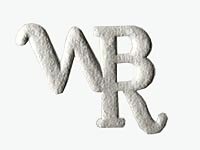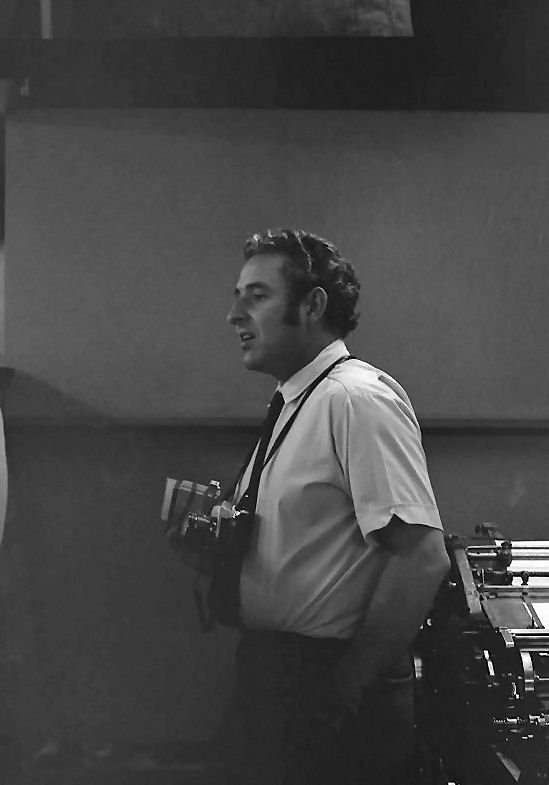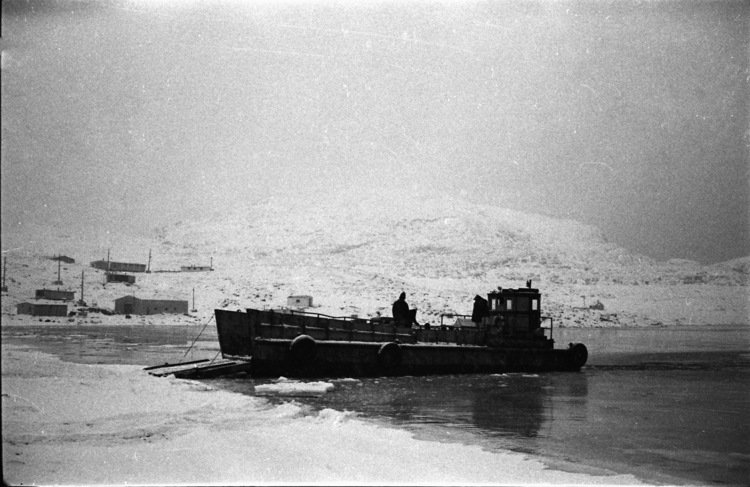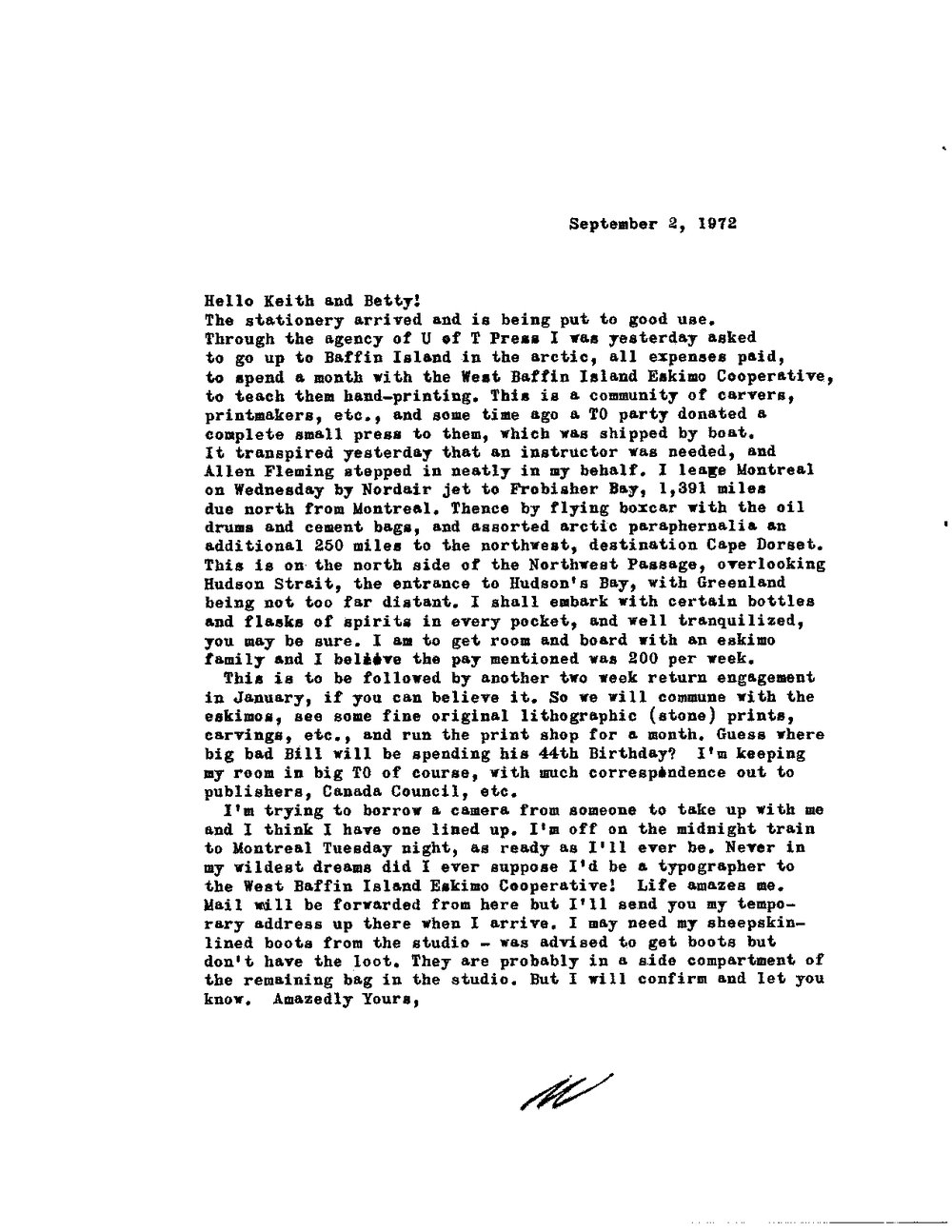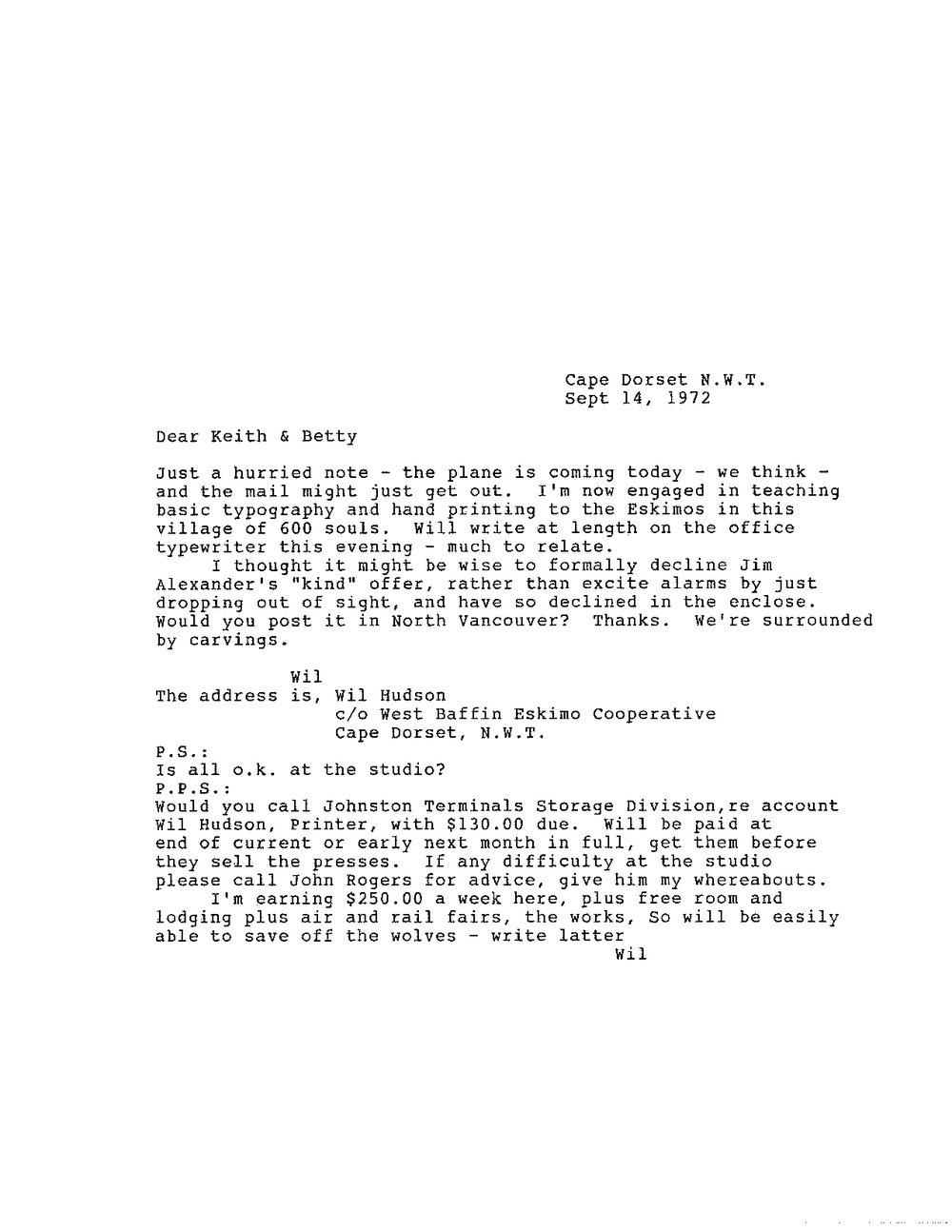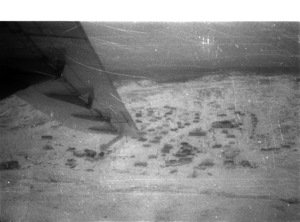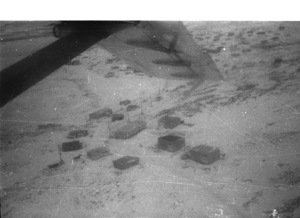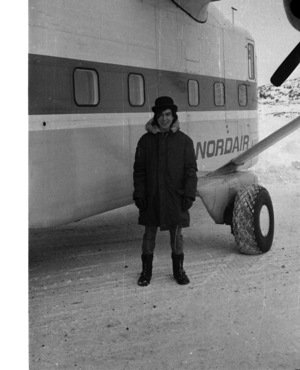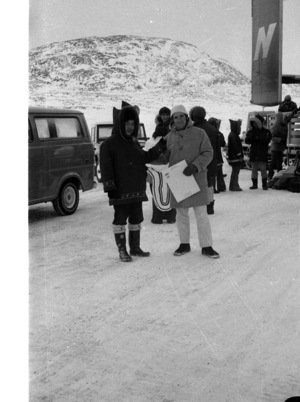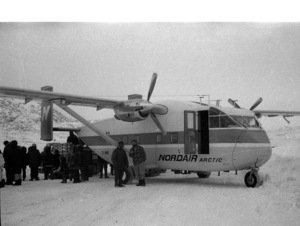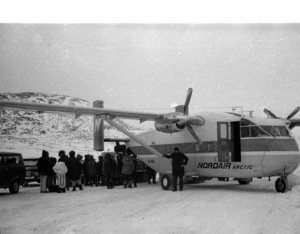Letterpress
Wi Hudson. photo: HH Johnston/ Sean Johnston: in the corner café at Hastings and Cambie where he always ate and used the loo. If I took them, it was when I delivered him proofs of my father’s photos of illustrations for one of his Alcuin Society books.
This is the first of several blog posts about Wil Hudson's contribution to Kinngait Studios' Typography Program. In this post we introduce the man.
For two decades, I’ve heard stories about Wil Hudson. Everyone that’s worked for the West Baffin Eskimo Co-op (WBEC) has a history and a story, but Wil’s seemed somehow larger than life. Wil established and ran Kingait Press (the WBEC’s typography program) from 1972 to 1979. Written histories of the Co-op sometimes mention his name, but no one seemed to know much about him, or they’d forgotten about him because he’d been out of touch for so long.
As I traveled back and forth to Cape Dorset, I’d often stay with Terry and Leslie Ryan to talk over studio business or just catch up. I am fond of the Ryan’s. Their house was like a temple to the creative mind and there were beautifully framed broadsides, printed by Wil Hudson, scattered about the place. Terry hired Wil back in 1972 and fostered his genius until Wil decided to pack up and move on in 1979. Terry often expressed regret for not mending bridges with Wil. Now that I know a little more about Wil and this period of the Co-op’s history, I understand his reticence. Perhaps some things are just better left alone.
The Search Begins
When I initially searched the internet using Wil’s name, I came across this site, which led me to P22 and Richard Kegler.
Richard kindly pointed me in a few directions, all of which paid off, including this one:
Hello William,
Sorry for the delay is replying to you. This message was just forwarded to me. We (P22) took on Gerald Giampa's Lanston Type Co digital assets and kept his website intact as a curiosity/ memorial. I never met Wil Husdon, but I somehow thought he was deceased. You might try Eric Swanick at Simon Frasier University who would undoubtedly know
Best regards, Richard Kegler
William:
I have copied Gina Page in this email. She knows Wil and will arrange for you to contact him. There is in News from the Rare Book Room, no.17, June, 1978, a few pages on Hudson namely a brief introduction and a bibliography of his imprints. He did do printing for the local Alcuin Society and had his own imprint Grouse Mountain Press. I can send you this article if you would like. My apologies for not being more assistance. Gina will make up for my shortfall. Best wishes in your research.
Regards,
Eric Swanick
Head, Special Collections/Gifts Librarian
W.A.C.Bennett Library
Simon Fraser University
Gina Page (GP) is an artist/educator and was a close friend and advocate for Wil:
I first met Wil when he moved to Powell River in the late 1970's. We met through mutual friends, Keith and Elizabeth Shields. Keith was a very good sculptor and did a wonderful bust of Wil. I'm not sure where it is at the moment, either still in Powell River or somewhere in Vancouver. Wil was my first typesetting teacher. I was enormously impressed by the classical beauty of his work, and his knowledge in general. When Wil left Powell River in the early 1990's, he sold his presses, type and other equipment through Laura Walz, who still lives in Powell River and who works at the Powell River Peak, the local newspaper. I know that she sold some of Wil's things to Crispen Elsted of Barbarian Press, located in Mission, BC, in the Fraser Valley. I'm not sure where the rest of it went, but Laura would know.
Photo courtesy Gina Page. Bust of Wil Hudson by Keith Shields
Gina is also on the board of the Alcuin Society (Wil printed the Society’s first projects and was a founding member in 1965*). She knew Wil from Vancouver and Powell River, where he spent much of his life before and after Dorset’s typography experiment. Through Gina, I discovered that Wil was in a retirement home (Crestway) in Creston, BC. She gave me his contact information and also connected me with Dianne Grant.
*source From Hand to Hand, a Gathering of Book Arts in British Columbia by Anne Tayler and Megan Nelson for the Alcuin Society 1986.
Dianne Grant (DG) was a neighbour and close friend of Wil’s in Creston. Dianne helped care for Wil through a number of transitions during the winter of his life and was there on January 11, 2014 when Wil passed away. Dianne was tasked with carrying out Wil’s last will and testament, including the final dispersal of his effects and the spreading his ashes along a small brook in Creston with friends.
Hi William,
I am Wil’s friend Dianne Grant. We are off to England, so I have notified a friend with your e-mail address to assist you in a rendezvous phone call with Wil. She is a good friend and I have asked her to contact you. Her name is Barbara Aguero. I hope this helps you out.Sincerely,
Dianne Grant
(Email, April 20, 2013)
Barbara agreed to help me with my research. The process went like this. I’d email a list of questions. Barbra would then interview Wil, transcribe his answers and email them to me. Wil inspired incredible devotion in his friends and for Barbra to do this while Wil struggled with conjunctive heart disease was remarkable.
From Gina and Barbara, I not only learned about Wil, but also about the print community in BC and beyond. I learned about his presses and their travels around the continent, peculiarities in his practice that are only evident to master printers like Crispin Elsted of Barbarian Press, and praise from almost everyone for Wil’s abilities as a printer.
I caught up with Bruce Paterson almost a year after Wil's death. Bruce is an artist and a close friend of Wil's.
Wil always wanted his ashes spread in the woods overlooking a bubbling stream along with his father's. He had held on to his father's ashes since 1945 and thought very highly of him. We found a perfect spot for their ashes on Summit Creek and I scattered them just as he wanted it. It's a secluded spot among the trees and I visit it often when I take my dogs out there for a good scamper. Don't get me wrong, I don't expect to see him or anything like that! All the best Bruce.
I got to know Wil very closely over the past three years or so and we were both hard and fast friends. I admired Wil's character and sensibilties and we had a lot in common. We spent many hours discussing, all manner of things; Wil was well read and as the saying goes, did not suffer fools well at all. I'm please to have met Wil when he was at least in decent shape to get around and do things. It was a real tragedy to see him falter and fade away in front of my eyes. This deterioration all began when Wil was forced out of his digs on 11th when the owners of the property he was renting from, sold out. The stress he suffered from this sudden shift in security triggered a series of small strokes and we will never know the extent of that damage but the added trauma of having to move and give up his beloved cats was too much for him -especially when he landed in a situation run by a church who were highly critical of his life style. Too, they accused Wil of bringing bedbugs into the apartment he rented from them, all of which was untrue; the establishment had a reputation for bedbug infestations before he arrived. So poor Wil had to endure yet another humiliation and this really did not help his conditions. The slide in his health was obvious and a year or so later he got admitted into a health care unit where he remained until his death. I made a point of trying to see Wil most days.
I spoke to Wil just once. One evening, I phoned him from my home in Newfoundland. I was full of questions, but when I heard his voice it reminded me of my mother’s near the end of her long life. I introduced myself, my throat tightening as I held back the emotion, and said I’d like to get to know him. He said he’d like that as well. If I emailed Barbara questions, would he try to answer them? He said he would. He then noted that he was feeling poorly, thanked me for calling and said goodbye. I was totally unprepared for my emotional reaction, but at the same time, really proud that I got to talk to him. I never heard his voice again.
Wil is so delighted you have made contact with him. He is very hard to understand on the phone as his words are slurred from many small strokes. He is embarrassed with his speech as people ask him to repeat himself over and over again. Like I said, his mind is still sharp and has not been affected by the strokes. I will give him your e-mail to read. I am off to England for a few weeks but will be back mid May. I will drop the letters off tomorrow before we leave town.”
(Email, DG)
The Visual Record
My web search also led me to a collection of photos by HH Johnston on Flickr. These were the first images I’d seen of Wil, other than a few photos taken by Tessa MacIntosh in Cape Dorset in the early 1970s.
Through Barbra, I asked Wil if HH Johnston had visited him in Cape Dorset:
HH Johnson was Wil's friend in Burnaby (a suburb of Vancouver). Wil took all the photos and sent them down to HH Johnson to be developed. They appeared on the internet as Mr. Johnson's son Sean put them there. Wil has no pictures of Dorset, other than those that appeared on the internet. HH Johnson never travelled to Dorset to visit Wil, but he did visit Wil in Powell River.
Above: HH Johston. Photo: HH Johnston Collection, courtesy Sean Johnston
I contacted Sean about permission to use the his photos. Not only did he generously agree, but he sent more photos that he hadn’t posted before!
I sent some of these photos to Wil (annotated with arrows) along with a series of questions about Cape Dorset. I also included some shots I’d taken to show him the community today. In Wil’s day, Cape Dorset had a population of about 500. Today, it’s about 1500 strong!
Cape Dorset, view of "the valley" circa 1973-75. Photo courtesy Tessa MacIntosh
Regarding the photos, Wil was very excited to see them! He kept returning to them over the course of the conversation, and pointing out various buildings to me. The black and white photo was how Dorset looked when he arrived there in 1972. Wil told me that he lived in Dorset from 1972 to 1979.
Dorset as it appeared a few years ago. The second floor was Wil's and now my apartment.
Photo: HH Johnston Collection, courtesy Sean Johnston
Wil lived in both of the buildings you pointed out with red arrows. He lived in building No. 1, the little match box house, while he was designing building # 2. He then moved over to building #2 when it was completed, and lived upstairs, while the printing shop was downstairs. His lathe was in the back room, and this lathe is now stored at his good friend Jennifer's house, here in the Kootenays. Wil also said that it looks like his little match box house was moved closer to building # 2, judging from the current photo. He said that while he was the designer of #2, the carpenter was a gentleman called Shuacu. Wil spelt this out for me, and I hope that I have it right. He also pointed out the Pacslak [Pitseolak] School. It was [is] located just to the right of arrow # 1 (the actual arrowhead, not the red line going down to it). This is where Wil became a Canadian Citizen in 1977. The flying judge made him a citizen. I asked Wil if he had to hold his nose while he swore allegiance to the Queen, and he said yes. Just to the left of arrow #2, (the arrow head again) was [is] the medical clinic. Several times Wil mentioned that you now live in his old apartment. He really enjoyed the photos, and I could see that the longer he looked at the old photo of Dorset, the more memories came back to him.
[Wil] says that the photo of the barge arriving with cargo on it looked just like that in the seventies. Photo: HH Johnston Collection, courtesy Sean Johnston.
He says that the photo of the barge arriving with cargo on it looked just like that in the seventies. As mentioned above, Shuctu, the carpenter appears in the photo of Wil with the 2 eskimo gentleman standing on the unfinished building. Shuctu is in the middle. Wil noted that they have painted the school red and blue now, and that in his day it was white. The big building on the hill wasn't there when Wil was there. The population was 500 when he was there. It has changed a lot", Wil said of the photos of modern day Dorset. Wil got a real chuckle out of "History is Bunk, Ford is Bunk" He said , "Aphorism by Wil Hudson" This was printed in about 1976. Wil would love to see more photos!!
(Email, BA July 14, 2013)
Photo: HH Johnston Collection, courtesy Sean Johnston
Shuctu, the carpenter, appears in the photo of Wil with the 2 eskimo gentleman standing on the unfinished building. Shuctu is in the middle.... Wil told me that another eskimo gentleman took this photo.
Photo: HH Johnston Collection, courtesy Sean Johnston.
A previously unseen photo showing Wil on the new floor of the typography building. I had always understood that there was a cement pad poured where the press was going to be put but clearly you can see that it was just reinforced in two places. Wil is standing on the location of the "Little Giant" press. The other spot, to the left of Wil, is where either the Vandercook 4T or the platen press eventually sat.
Photo: HH Johnston Collection, courtesy Sean Johnston.
These pictures are of the construction of the typography building, known now as the lithography studio. Sean Johnston kindly scanned all of the negatives that he has in his collection so I could better document Wil's Cape Dorset experience.
Early Details
I’d heard that Wil was married to a preacher’s daughter named Marion, but that her father had an injury and requested that she come back home to care for him. I’d also heard that Wil came to Canada to avoid the draft. When asked about the details of his life prior to Cape Dorset, Wil replied:
Now regarding your list of questions, Wil was born Sept. 19th, 1928, in Milwakee. He lived in Milwakee until he was 13 years old, when both he and his mother moved to San Francisco, following the death of his father. Wil never lived in San Diego, though he has been there. Wil said that he studied naval architecture in San Francisco, and that he worked for a naval architect in that city. Wil has never served in the military, and yes he was married to a preacher's daughter, "Marion". The preacher did not request the return of his daughter, nor was the preacher injured in any way. Wil said that it was an amicable break up, and that Marion actually organized the shipment of his printing equipment via freighter from San Francisco to Vancouver B.C. Just prior to his trip to Dorset, Wil had been living and working in Vancouver.
The Dorset Experiment
The story I heard from Terry was that he approached Stan Bevington of Coach House Press in Toronto about finding a printer for an experimental Typographic project in Cape Dorset. One fellow was all lined up to go but at the last minute thought better of it. Stan approached Wil who had moved to Toronto to try his luck and accepted the job. This is Wil’s correction.
"Bluimgto" - this is not the correct name of the fellow who was originally supposed to go up to Dorset. Wil is trying to remember the correct name. Anyhow, this fellow worked for Sam (Stan) Bevington at Coachhouse Press. When he opted out of the job Wil was recommended to Sam Bevington by Alan Fleming, of the University of Toronto Press. Wil was in Toronto at that time, and had been for several months, having left Vancouver. He was trying to establish connections there, and lived on Bellvue off College. Wil had never thought of going up north prior to this offer.
In his own words here is a letter to Kieth and Betty Shields.
Brendan Shields collection
Clearly Wil is excited to be going to the arctic to ply his trade. The price for things like sandwiches are more now than then to be sure but all the countless hotels in Iqaluit (formerly Frobisher Bay) have hot running water.
Brendan Shields collection
Arriving in Cape Dorset
Terry told this story about Wil’s arrival in Dorset for the first time. Terry was quite impressed with Wil’s attire - a black bowler hat, long black coat and a long black beard. As Terry approached, he realized that Wil was drunk and Terry thought to himself “Oh no, this will never do!” However, Wil never drank again and he later explained to Terry that the alcohol was his way of dealing with a dislike of flying. When it came time for Wil to fly out, he approached Terry about obtaining a bottle. Terry complied and Wil prepared for take-off.
In Wil's own words, a letter to Kieth and Betty Shields
Brendan Shields Collection
Above: The original airstrip in Cape Dorset near Dead Dog Lake.
Photo: HH Johnston Collection, courtesy Sean Johnston
Above: Wil standing next to a Twin Otter. Notice the snowmobiles in the background.
Photo: HH Johnston Collection, courtesy Sean Johnston
I had assumed that Wil shipped all of his presses to Cape Dorset but this letter indicates otherwise. There couldn't have been much set up for Wil to begin teaching, as we will see a little later he talks about setting up the physical studios.
Brendan Shields Collection
top left to right: Two very nice aerial images of Cape Dorset taken by Wil. A young Jimmy Manning wearing Wil's iconic bowler hat. Lower row left to right: Terry Ryan and Kananginak Pootoogook and two photos of the Nordair aircraft with the associated hoard of "rampies" off loading cargo into vans.
This scene that Wil describes is as it is ever was.
Brendan Shields collection
Building the Typography Workshop, Kinngait Studio’s
Kingait was the name of Wil's publishing outfit in Dorset. It was named after the tall hill in Dorset that overlooks the town, and Baffin Island.
Email, BA July 14, 2014
Wil brought three printing presses up to Dorset with him, and they all went via sea freighter. The Little Giant press, 12" X 18", came all the way from Vancouver. He had used it in his shop in Vancouver. The other 2 presses, the Vandercook, and the 10” X 15" press were both donated. The Vandercook was donated by Bob Leith of Toronto. Wil organized their shipment from Toronto to Dorset by sea freighter. Wil said that he brought numerous fonts up with him. He brought up the 14 point Van Dyke font and this is what he used up there.
(Email, BA April 23, 2013)
Also to clarify the info about the printing presses, both the 10” X 15” printing press, and the 12” x 18” press were owned by Wil, and both originally came from California. Marion shipped them up to Wil in Vancouver, and when Wil went to Dorset, he had them shipped up there. The Vandercook was donated by Bob Leith, of Toronto and it was also freighted up to Dorset.
(Ibid)
Among Wil’s accomplishments was the design and manufacturer of syllabic type. It’s believed that this was the first production of an aboriginal language printing type unconnected with missionary pursuits.
Jim Rimmer also developed a syllabic font for the Cree in 2006 but the characters do not share the same spoken values.
Wil had the syllabic type font made at Bomac-Batten on West Queen Street in Toronto. It was cut out of black paper and mounted for the engraver. These should still be among Terry's things in Dorset.
(Email BA July 14, 21013)
There are numerous references to Wil’s lathe including this one from Terry Ryan:
The fact that he set up a metal lathe and manufactured parts to maintain the antique presses truly impressed them [the Inuit] - and me. His hands-on approach to meet whatever technical challenges arose garnered him real admiration from a people accustomed to invention in adversity.
(Cape Dorset Prints: A Retrospective, p. 50)
And these:
The lathe was in both the Matchbox house, and the new apartment. It moved with Wil from the smaller house to the new apartment in 1975. Wil added that the ship that took his presses and the lathe and other supplies up to Dorset sank* the next trip up to Dorset. He is trying hard to remember the name of that ship, but stressed that it was NOT the Nascopi.
(Email BA July 14, 2013)
*Wil wanted me to clarify something about the ship that sank on its next rip up north. He said that it was not destined for Dorset when it sank. It was shipping railroad tyes up north, and the load shifted, and the boat sank. He wasn't sure of the ships destination, but he might remember later and that it did have a French Canadian name.
(Email BA April 24 2013)
His lathe was in the back room, and this lathe is now stored at his good friend Jennifer's house, here in the Kootenays.
(Email BA April 22, 2013)
It was also mentioned in an essay Sean Johnston wrote for the Alcuin Society titled Wil Hudson Photographs, 1970s:
Wil was outspokenly critical of convention (displaying the framed poem “Behold the aspidistra! indifferent to what may pass… nor does it blossom or ever bear fruit, just like the middle class”), but came often to our suburban home through the 1970s for dinner and conversation, usually accompanied by artistic folk and friends. For a time, he stored his excess items in our house. Notable among them were piles of model railroading magazines and a Unimat mini-lathe.
Northern Life
I framed some pictures of Wil at Cape Dorset to put in his room, but the days on Baffin Island seem like distant memories and he does not want to talk about them. I know he has exceptional prints etc. in his belongings. He has willed an artist friend in town all his papers and books when he dies and seems to have no attachment to them anymore.
(Email DG April 20, 2013)
I think Wil's northern years are something only other northerners can relate to. Wil’s situation was so unorthodox, it’s hard for anyone without first-hand arctic experience to believe. I’ve given up talking about many of my own arctic experiences because people just don't believe me, or think that I’m exaggerating. They’re just too far removed from most people’s understanding of “normal”. Perhaps Wil felt the same? When I brought up Cape Dorset he did not hesitate to talk about the north one bit and I think this is because we have a shared experience. Misery loves company.
Terry thinks that northern life suited Wil. He remembers Wil sitting in the doorway of his little shack (called matchboxes) in the dead of winter smoking his pipe. The heat in those little building was so intense that you had to escape or open the door to get relief. Inside, Terry recalled that there was hardly enough room to walk and that the table was so full of Wil's books and projects and cats that he could hardly find a space for a tea cup.
And Speaking of Cats ....
Cat names: Tiffyoo, who was born in the Anglican mission (Cape Dorset), and given to Wil by Chris the missionary. The other cat was called Godot, after the play by Beckett. Wil said that he and Chris the missionary got on very well. There had been a Catholic mission in Dorset before Wil arrived , but it had already been abandoned by the time Wil got there. Erazmuth was the name of his cat in Vancouver, the first cat he had in Canada. Erazmuth was unfortunately shot by the fellow Wil gave the cat to when he left Vancouver.
(Email, BA 13-07-14)
Photo: HH Johnston Collection, courtesy Sean Johnston
He named his cats Tiffy Moo Moo, who he had in Cape Dorset, Godot, Beethoven, Chuzzelwit, Heffalump, Ambrose, Erasmus,Imogene, Ocmar, Griffo, Pico, Maximillian, Pippi and P.T. He probably had more but these are the ones he talked about. He loved his cats.
(Email DG January 21, 2014)
Photo: A comfortable spot.
Photo: HH Johnston Collection, courtesy Sean Johnston
He has owned over 20 cats in his lifetime and he has given them all prestigious literary names. I never meet a person that was so in love with cats. His tenderness and compassion for his feline friends was unconditional and sincere. He made sure they ate first before he spent money on food for himself.
(Email, DG)
Train Sets
One of Wil’s “projects” was an impressive train set. When he finished building the apartment above the lithography/typography building, Wil installed train tracks around the perimeter of the room. You had to raise a draw bridge to get in and out of the door to the apartment.
Just up to a few months ago, Wil had a train set and tracks set up in his apartment, it took up three quarters of his living space. We had to take it down when he moved into the seniors home. I have a steam ship in my basement that he built over a 17 year period, all the steam engine parts etc. were made from scratch and it was ready to be launched but he had to give it up as he ran out of energy to finish it. ... He used cardboard boxes for furniture and his easy chair was nothing more then a plastic lawn chair. All his friends got together and found a remote controlled recliner and he has become very attached to it.”
Email from DG to GP and forwarded to me, April 20, 2013)
Gerald Giampa
By happen-chance I rented the same premises, 323 in Cambie Street, after Wil Hudson had moved to work with the Inuit at the West Baffin Eskimo Co-operative Ltd., Cape Dorset, Northwest Territories, Canada. Wil is the designer of the Inuit Syllabic. A well written book would prove incapable of encapsulating the "heart or core" of Wil Hudson. What most referred to as Wil's peculiar personality quirks were in fact philosophy, wisdom and Wil's inner beliefs of unfathomable depth. His reverence for craftsmanship and the typographical arts was indicative of monastic disciplines.
Gerald Giampa
When Gerald Giampa died, Wil saw his death announcement in the Vancouver Sun. I asked Wil if he wanted me to contact his family on his behalf. He must have had some issues with Gerald, as he declined the offer. I did notify the family that Wil was alive and well, living in Creston. The family seemed bitter that he had never tried to contact Gerald when he was alive as he had great admiration for Wil.
(Email DG April 20, 2013)
Wil’s Work from the Dorset Years
Above: Wil got a real chuckle out of "History is Bunk, Ford is Bunk" He said , "Aphorism by Wil Hudson" This was printed in about 1976.
Above: Printed commemorative piece that is still on the wall just as you enter the lithography studio in Cape Dorset.
About the above printed commemorative plaque, I tried to find where the small bird came from so I contacted Barbarian Press to see if they inherited the dingbat when they aquired Will's type collections after he left Dorset. He had never seen the bird before and suggested perhaps someone in Dorset made it or somebody made a sketch and Will had it made like he did with the syllabics. Up until recently I had given up trying to find the bird until I found it in a collection available at Skyline Type.
Running the Goat Press in Tors Cove, Newfoundland
Recently I had the pleasure of spending some time at Running the Goat Press in Tors Cove not 5 minutes from my home. Visiting artist Abegail Rorer and Marnie Parsons have been collaborating on a few projects together and I had the opportunity to visit while I serviced Marnie's Vandercook press. Running the Goat Press has become the hub for artists, writers and all hands interested in the arts in Newfoundland, a very welcoming atmosphere. Marnie had recently received a gift of Digbats (as they are called in the Letterpress vernacular) that were once in use at the original Letterpress shop called Tors Cove Printing, long since closed. As I looked at the collection I found the same stork again, third row from the top, fifth from the right hand side. This small stork keeps reappearing in my life ever since I first posted that I couldn't find it.
Above: Syllabic font that Wil designed and manufactured for the variety of projects he had intended to pursue.
Hi Bill,
One of the pieces that Wil printed while in Cape Dorset was that wonderful Arthur Waley translation of the poem by Po Chu-i that I sent you. At the bottom of the broadside it is dated Christmas 1973. I like to read that poem and think of Wil, working away on the settingof the type and printing it, while winter storms swirl around outside in the cold and dark.”
(Email GP April 23, 2013)
MADLY SINGING IN THE MOUNTAINS
There is no one among men that has not a special failing:
And my failing consists in writing verses.
I have broken away from the thousand ties of life :
But this infirmity still remains behind.
Each time that I look at a fine landscape.
Each time that I meet a loved friend,
I raise my voice and recite a stanza of poetry
And am glad as though a God had crossed my path.
Ever since the day I was banished to Hsün-yang
Half my time I have lived among the hills.
And often, when I have finished a new poem,
Alone I climb the road to the Eastern Rock.
I lean my body on the banks of white stone :
I pull down with my hands a green cassia branch.
My mad singing startles the valleys and hills:
The apes and birds all come to peep.
Fearing to become a laughing-stock to the world,
I choose a place that is unfrequented by men.
Somehow that poem seems to express something quintessential about Wil.
Wil gave me quite a few of his printed material several years ago with the instruction that it eventually be given to UBC Special Collections, which I have already done. According to his friend Dianna Grant, Wil has left the rest of his stuff to an artist friend in Creston, whose name I do not yet know.
(Ibid)
Bill:
Go to this link (apparently not working any longer) and you can check on SFU's Wil Hudson holdings. Also a couple years ago a woman from Fredericton brought in two drypoints by Wil Hudson. (Her mother lives in Burnaby.) Hope this helps. And if there is Hudson materials you should like to part with there would be a good home at SFU.
Best wishes with your research.
(Email, Eric Swanick June 12, 2013)
"The woman from Fredericton' is my sister, Dr Wendy Johnston, who donated items that ( think our mother (Frances Johnston nee Coulombe) had kept...."
Sean Johnston September 4 2014
Above: I unwrapped some type that had been packaged in sheets of newsprint. The papers were proofs from a broadside Wil had been printing. Instead of wasting the paper, he used it as packing material. You can see the lighter areas where the lead type rested against the paper, the rest has turned yellow with age and acidity.
This same broadside is featured in the publication called Cape Dorset a Retrospective authored by Leslie Boyd Ryan. On page 51, it appears in Roman Orthography Inuktitut and English and does not include the reference to Mr. McMurtrie. It appeared as a front piece to the story called "A reminiscence of Saggiak"
photo:Leslie Boyd
Leslie Boyd also wrote about the McMurtie broadside in the forward of the 2014 Cape Dorset Calendar, which celebrates the work of Kenojuak Ashevak:
I have a framed press sheet from the now defunct typography project in Cape Dorset that says: Beauty is the visible expression....... It comes to mind as I reflect on Kenojuak Ashevak's remarkable life and career.....
Above: Another example of type packaging.
Above: Another example of type packaging.
Wil’s leaving Cape Dorset
I asked Wil how on earth he remembered so much about Cape Dorset and the people there. Wil said " I was very much there".
...Wil left Dorset in October of 1979. This was a planned exit. He sent all of his equipment out on the summer supply ship. Then in October, he took the plane to Timmins, Ontario, traveling on to England... He said that London was a real culture shock after being in the North for seven years.
Note: WIl went to England to study at the Monotype Corporation and returned to British Columbia in 1979 and set up shop in Powell River. source, From Hand to Hand A Gathering of Book Arts in British Columbia complied and edited by Tayler and Nelson, The Alcuin Society 1986.
"I do remember him talking about going to England to learn about the Monotype machine, which he had in his shop in Powell River. He never used it very much. I can remember him sitting at it only once. I think his plans for using it never materialized." email correspondence with Laura Walz September 2014
photo: Sean Johnston Collection 71-76
...Wil said that he never missed Dorset after he left there. He also stated that he never wrote to anyone up there after he left. Wil did receive a letter from Terry saying that his wife had left him, but this letter was never answered by Wil. He said that he knew if he answered it, an invitation to return to Dorset would be forth coming. "I was not about to go back up there, any more than I'd return to America", Wil said. "It was a had experience." Please note had, not bad. Wil clarified this for me.
(Email, BA July 14, 2013)
It was understood that the WBEC would pay for all the typography equipment to be shipped north to Cape Dorset and that the equipment would remain in Dorset when Wil left. Terry wasn’t in the community when Wil shipped everything south on the sea lift, nor was he there when Wil left.
There were a lot of personality conflicts at the Co-op at that time. The arctic seems to attract strong personalities. Throw them together in close proximity and conflict is inevitable.
Wil also reflected on the lithographer from Halifax, whose name was Wally. He is trying to remember Wally's last name. They called Wally "Elevator Shoes", or just "Shoes", due to the platform shoes that he used to wear. (Who can forget the seventies wardrobe??!) Wally had a "personality disorder", in that he "made an enemy of everyone". Apparently Wally really rubbed everyone the wrong way. Steve Birell, the accountant from Toronto, also rubbed everyone the wrong way, and like Wally, "made an enemy of everyone". Steve's nickname was "The Toronto Torpedo". Both Wally and Steve were in Dorset when Wil left there in 1979.
(Email BA July 14, 2013)
Above: Pitseolak Niviaksi (left) and Wally (centre) leaning on the press. Pee Mikkigak (right) applying the rosin or talc.
Photo courtesy Tessa MacIntosh
Wil also reflected on the lithographer from Halifax, whose name was Wally. He is trying to remember Wally's last name. They called Wally "Elevator Shoes", or just "Shoes", due to the platform shoes that he used to wear. (Who can forget the seventies wardrobe??!) Wally had a "personality disorder", in that he "made an enemy of everyone". Apparently Wally really rubbed everyone the wrong way. Steve Birell, the accountant from Toronto, also rubbed everyone the wrong way, and like Wally, "made an enemy of everyone". Steve's nickname was "The Toronto Torpedo". Both Wally and Steve were in Dorset when Wil left there in 1979....
..."Stan Birell" - his name is/was Steve Birell, and he was an accountant from Toronto who lived in Dorset. He had nothing to do with printing. He did not recruit Wil.
(Email BA July 14, 2013)
Follow up
Hi Bill,
I just wanted to let you know Wil passed away on January 11th. Gina might have written to you already. He went peacefully with his friends at his side. I have found a typesetting in his belongings you might like to look at. It was carefully wrapped in layers of paper. It is quite heavy so I don’t know how to send it and I would need your address as well. Wil was a great friend and we will miss him.
Wil’s friend, Dianne
(Email DG January 17, 2014)
Hi Bill,
Wil had no next of kin, his family were his friends. He carried around his dad’s ashes for over 45 years. Bruce Patterson and I (close friends of Wil) will combine his dad’s ashes and his own, and will spread them in the forest along a stream, come Spring, as Wil requested. He died in a extended care nursing home called Crestview in Creston. Since his death many of Wil’s friends in Creston have written memoirs of his life here. Gina would be the person to contact for information on his life before Creston. If I can help with any information you might want, I would happily assist you. Wil has many friends that stayed loyal to him right to the end. He was a rare remarkable human being and we loved him for being who he was.
Sincerely, Dianne (Grant) ibidWil lost his ability to talk many many months ago and his friends began to drop off as they found it too hard to understand what he was saying and they felt uncomfortable and frustrated. For some strange reason I learned to understand the movement of his mouth and the sounds that came out. It was a real gift and my husband could not understand how I did it. I felt blessed to be his spokesperson, and he always got his messages across.
When Wil was forced to move out of his little house behind where I live, he moved into a senior’s low income apartment. It happened to be infected with bed bugs and before Wil knew it they were in all his books and belongings. Jennifer, Barb and I had to gather all his belongings and seal them in plastic containers for a year, so Wil lived almost a year without his beloved books, train set and basically all his belongings were sealed in these containers. They sprayed regularly and finally got rid of them but the whole ordeal really took it’s toll on Wil and his health, mentally and physically. He was falling quite a bit after that and the paramedics were constantly being called to pick him up. We finally got Wil into a care facilty, one of the best in the province. He was very well taken care of by Crestview and the workers treated him with respect and dignity. It is too bad some of his close friends were not with him at the end of his life but it is hard for some people to relate to his down turn. He really missed their friendship, as Wil was a very social person. Gina wrote cards to Wil right to the end. Just thought I would let you know a bit of Wil’s history towards the end of his life, not too pretty.
Yours truly, Dianne
In Loving Memory of Wil Hudson
You cannot pick your family, sometimes you're lucky enough that people pick you. Wil Hudson picked our little coffee shop, very soon after we opened. Morning coffee soon became afternoon coffee as well, now Wil was a regular. Some people thought that maybe he wasn't a desirable patron in his scruffy ZZ Top beard, baggy coat, hat, and shades, not to mention his somewhat opinionated personality. We however fell in love with him almost immediately. Wil became part of our Buffalo Trails Family.
The rebellious streak, that spark, that gleam in his eye when he knew he was going against common opinion was so intriguing. We loved his phrasing, his wit, his incredible smarts. He was our spell check, history teacher and our philosopher but mostly our friend. Wil would come in, we would get his red Pharasave Mug down on the counter (courtesy of his very close friends Mike and Barb), and top up his Mug with "Bison Spirit" coffee. The darker the coffee the better and don't forget the straw that he kept in his hat for multiple uses. He would put his money up and say "put the residue in the tippaccino". He said this every time, enjoying the routine. The girls here loved him. Amanda, Catherine, Reanna, Lexi, Michelle and Jess just to name a few.
Wil lived his life to his own beat, he was unique. A "hypocritical vegetarian " he liked to call himself. Sharing great memories of his time spent in San Francisco and up north were always entertaining to listen to. He loved my kids Libby, Miah and Hannah and got a kick out of Libby calling me Home Slice. He came in one day and I was bundled up in a sweater , he said " you look homeslicish as hell today Michele" . That just makes me smile everytime I think of it. I loved the twinkle in his eye when the kids came in to say "hi ". He showed such love for babies and had a healthy respect for the miracle of life. One day I thought Wil was asleep, eyes closed, hat pulled down. I asked him if he was tired and he said "No, I have memorized every single word on the chalkboard and I would be happy to recite it", which he did flawlessly. Friends of Wil soon made Buffalo Trails their visiting spot and our BT family grew. Along with Barb and Mike Ramaradhya came Bruce Paterson, Bob Deacon, Jennifer Hutzkal, Dianne Grant, George and Louise Esch, Don Falck, Maureen Nichol, Don Falck, Gary and his new babyChristopher, Art from Powell River, just to name a few of the many. Discussions of politics, history, literature, human nature, articles in the Advance, trains, boats and of course animals, especially cats , happened here on an almost daily basis. The love he had for friends and his fellow man was hard to see through the gruff exterior but lived so strong in his heart .
We had the pleasure of being a small part of the adventurous life of Wil Hudson's and we are much richer for it. Thank-you for your character, insight, loyalty and patronage. I picture you sipping on your coffee in your spot, at your table at Buffalo Trails and I feel joy. Thank you Wil for your character, loyalty, insight, but most of all your friendship .
Your spirit is on that train.
Rest in Peace Wil
Michele Staggs
More about Wil by others
http://www.memorybc.ca/wil-hudson-fonds;rad
http://heavenlymonkeybooks.blogspot.ca/search?q=Wil+Hudson
http://filmsdivisionindia.tumblr.com/post/90663503682/the-bead-game-director-ishu-patel-year-1977
http://archivesfa.library.yorku.ca/filelist/2008-002.529.htm
See 1947-1977 Allan Flemming fond, his contribution to Canada Council grant for Dorset Fine Arts.
"I do remember him talking about going to England to learn about the Monotype machine, which he had in his shop in Powell River. He never used it very much. I can remember him sitting at it only once. I think his plans for using it never materialized." email correspondence with Laura Walz September 2014
photo: Sean Johnston Collection 71-76
Wil’s leaving Cape Dorset
I asked Wil how on earth he remembered so much about Cape Dorset and the people there. Wil said " I was very much there".
...Wil left Dorset in October of 1979. This was a planned exit. He sent all of his equipment out on the summer supply ship. Then in October, he took the plane to Timmins, Ontario, traveling on to England... He said that London was a real culture shock after being in the North for seven years.
Note: WIl went to England to study at the Monotype Corporation and returned to British Columbia in 1979 and set up shop in Powell River. source, From Hand to Hand A Gathering of Book Arts in British Columbia complied and edited by Tayler and Nelson, The Alcuin Society 1986.
"I do remember him talking about going to England to learn about the Monotype machine, which he had in his shop in Powell River. He never used it very much. I can remember him sitting at it only once. I think his plans for using it never materialized." email correspondence with Laura Walz September 2014
photo: Sean Johnston Collection 71-76
...Wil said that he never missed Dorset after he left there. He also stated that he never wrote to anyone up there after he left. Wil did receive a letter from Terry saying that his wife had left him, but this letter was never answered by Wil. He said that he knew if he answered it, an invitation to return to Dorset would be forth coming. "I was not about to go back up there, any more than I'd return to America", Wil said. "It was a had experience." Please note had, not bad. Wil clarified this for me.
(Email, BA July 14, 2013)
It was understood that the WBEC would pay for all the typography equipment to be shipped north to Cape Dorset and that the equipment would remain in Dorset when Wil left. Terry wasn’t in the community when Wil shipped everything south on the sea lift, nor was he there when Wil left.
There were a lot of personality conflicts at the Co-op at that time. The arctic seems to attract strong personalities. Throw them together in close proximity and conflict is inevitable.
Wil also reflected on the lithographer from Halifax, whose name was Wally. He is trying to remember Wally's last name. They called Wally "Elevator Shoes", or just "Shoes", due to the platform shoes that he used to wear. (Who can forget the seventies wardrobe??!) Wally had a "personality disorder", in that he "made an enemy of everyone". Apparently Wally really rubbed everyone the wrong way. Steve Birell, the accountant from Toronto, also rubbed everyone the wrong way, and like Wally, "made an enemy of everyone". Steve's nickname was "The Toronto Torpedo". Both Wally and Steve were in Dorset when Wil left there in 1979.
(Email BA July 14, 2013)
Above: Pitseolak (left) and Wally (centre) leaning on the press. Pee Mikkigak (right) applying the rosin or talc.
Photo courtesy Tessa MacIntosh
Wil also reflected on the lithographer from Halifax, whose name was Wally. He is trying to remember Wally's last name. They called Wally "Elevator Shoes", or just "Shoes", due to the platform shoes that he used to wear. (Who can forget the seventies wardrobe??!) Wally had a "personality disorder", in that he "made an enemy of everyone". Apparently Wally really rubbed everyone the wrong way. Steve Birell, the accountant from Toronto, also rubbed everyone the wrong way, and like Wally, "made an enemy of everyone". Steve's nickname was "The Toronto Torpedo". Both Wally and Steve were in Dorset when Wil left there in 1979....
..."Stan Birell" - his name is/was Steve Birell, and he was an accountant from Toronto who lived in Dorset. He had nothing to do with printing. He did not recruit Wil.
(Email BA July 14, 2013)
Follow up
Hi Bill,
I just wanted to let you know Wil passed away on January 11th. Gina might have written to you already. He went peacefully with his friends at his side. I have found a typesetting in his belongings you might like to look at. It was carefully wrapped in layers of paper. It is quite heavy so I don’t know how to send it and I would need your address as well. Wil was a great friend and we will miss him.
Wil’s friend, Dianne
(Email DG January 17, 2014)
Hi Bill,
Wil had no next of kin, his family were his friends. He carried around his dad’s ashes for over 45 years. Bruce Patterson and I (close friends of Wil) will combine his dad’s ashes and his own, and will spread them in the forest along a stream, come Spring, as Wil requested. He died in a extended care nursing home called Crestview in Creston. Since his death many of Wil’s friends in Creston have written memoirs of his life here. Gina would be the person to contact for information on his life before Creston. If I can help with any information you might want, I would happily assist you. Wil has many friends that stayed loyal to him right to the end. He was a rare remarkable human being and we loved him for being who he was.
Sincerely, Dianne (Grant) ibid
Wil lost his ability to talk many many months ago and his friends began to drop off as they found it too hard to understand what he was saying and they felt uncomfortable and frustrated. For some strange reason I learned to understand the movement of his mouth and the sounds that came out. It was a real gift and my husband could not understand how I did it. I felt blessed to be his spokesperson, and he always got his messages across.
When Wil was forced to move out of his little house behind where I live, he moved into a senior’s low income apartment. It happened to be infected with bed bugs and before Wil knew it they were in all his books and belongings. Jennifer, Barb and I had to gather all his belongings and seal them in plastic containers for a year, so Wil lived almost a year without his beloved books, train set and basically all his belongings were sealed in these containers. They sprayed regularly and finally got rid of them but the whole ordeal really took it’s toll on Wil and his health, mentally and physically. He was falling quite a bit after that and the paramedics were constantly being called to pick him up. We finally got Wil into a care facilty, one of the best in the province. He was very well taken care of by Crestview and the workers treated him with respect and dignity. It is too bad some of his close friends were not with him at the end of his life but it is hard for some people to relate to his down turn. He really missed their friendship, as Wil was a very social person. Gina wrote cards to Wil right to the end. Just thought I would let you know a bit of Wil’s history towards the end of his life, not too pretty.
Yours truly, Dianne
In Loving Memory of Wil Hudson
You cannot pick your family, sometimes you're lucky enough that people pick you. Wil Hudson picked our little coffee shop, very soon after we opened. Morning coffee soon became afternoon coffee as well, now Wil was a regular. Some people thought that maybe he wasn't a desirable patron in his scruffy ZZ Top beard, baggy coat, hat, and shades, not to mention his somewhat opinionated personality. We however fell in love with him almost immediately. Wil became part of our Buffalo Trails Family.
The rebellious streak, that spark, that gleam in his eye when he knew he was going against common opinion was so intriguing. We loved his phrasing, his wit, his incredible smarts. He was our spell check, history teacher and our philosopher but mostly our friend. Wil would come in, we would get his red Pharasave Mug down on the counter (courtesy of his very close friends Mike and Barb), and top up his Mug with "Bison Spirit" coffee. The darker the coffee the better and don't forget the straw that he kept in his hat for multiple uses. He would put his money up and say "put the residue in the tippaccino". He said this every time, enjoying the routine. The girls here loved him. Amanda, Catherine, Reanna, Lexi, Michelle and Jess just to name a few.
Wil lived his life to his own beat, he was unique. A "hypocritical vegetarian " he liked to call himself. Sharing great memories of his time spent in San Francisco and up north were always entertaining to listen to. He loved my kids Libby, Miah and Hannah and got a kick out of Libby calling me Home Slice. He came in one day and I was bundled up in a sweater , he said " you look homeslicish as hell today Michele" . That just makes me smile everytime I think of it. I loved the twinkle in his eye when the kids came in to say "hi ". He showed such love for babies and had a healthy respect for the miracle of life. One day I thought Wil was asleep, eyes closed, hat pulled down. I asked him if he was tired and he said "No, I have memorized every single word on the chalkboard and I would be happy to recite it", which he did flawlessly. Friends of Wil soon made Buffalo Trails their visiting spot and our BT family grew. Along with Barb and Mike Ramaradhya came Bruce Paterson, Bob Deacon, Jennifer Hutzkal, Dianne Grant, George and Louise Esch, Don Falck, Maureen Nichol, Don Falck, Gary and his new babyChristopher, Art from Powell River, just to name a few of the many. Discussions of politics, history, literature, human nature, articles in the Advance, trains, boats and of course animals, especially cats , happened here on an almost daily basis. The love he had for friends and his fellow man was hard to see through the gruff exterior but lived so strong in his heart .
We had the pleasure of being a small part of the adventurous life of Wil Hudson's and we are much richer for it. Thank-you for your character, insight, loyalty and patronage. I picture you sipping on your coffee in your spot, at your table at Buffalo Trails and I feel joy. Thank you Wil for your character, loyalty, insight, but most of all your friendship .
Your spirit is on that train.
Rest in Peace Wil
Michele Staggs
More about Wil by others
http://www.memorybc.ca/wil-hudson-fonds;rad
http://heavenlymonkeybooks.blogspot.ca/search?q=Wil+Hudson
http://filmsdivisionindia.tumblr.com/post/90663503682/the-bead-game-director-ishu-patel-year-1977
http://archivesfa.library.yorku.ca/filelist/2008-002.529.htm
See 1947-1977 Allan Flemming fond, his contribution to Canada Council grant for Dorset Fine Arts.
